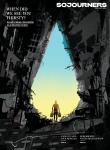Once, a woman told me the closest thing she had to a religion was speculative fiction. Just as spiritual practices do for many believers, reading Ursula Le Guin and Octavia Butler helped her face the haunting edge of humanity’s knowledge, those parts of being alive that refuse explanation.
This story is not so much about the nature of the unknown as the complicated ways people cope with it.
It’s this confrontation with mystery that Megan Giddings places at the center of her captivating novel Meet Me at the Crossroads. Seven doors appear around the world, each opening to a beautifully warped alternative dimension. Those who walk through these doors see meadows peppered with gold stones and orange deserts under purple skies — but they don’t always come back. Once people realize that the doors are “uncontrollable, unkillable and unknowable,” most ignore them or call them a hoax, aside from a few fringe religious groups. Woven with plenty of heart, this story is not so much about the nature of the unknown as the complicated ways people cope with it.
In Michigan, twins Ayanna and Olivia grow up near one of the doors, developing contrasting ideas of its meaning. Ayanna lives with their father, who raises her in a marginalized faith community that reveres the door as a divine invitation to embrace mystery. Olivia lives with their mother, a Catholic who rejects her ex-husband’s religion as heretical. Amid the tense family dynamics, the sisters remain close until, upon entering the door as teenagers, Olivia disappears.
As Ayanna grieves and grows and searches for answers, she encounters others who have gone to the alternative dimension and come back. She discovers that, despite the doors’ transformative effect on individuals, capitalism quickly compromises the positive potential of their otherworldly power and reduces them to just another commodity. One boy enters a door and comes back with healing powers, appearing on talk shows to warm applause and charging a pretty penny for his services. A duo of entrepreneurs leads expensive tours for those wealthy and reckless enough to brave the other side. The door-focused research institute where Ayanna works during college exists only through ethically fraught funding.
“Everyone wanted to believe that even the unreal could be controlled,” Giddings writes. “But whenever the extraordinary came into their lives with all its unruliness and depth, they always tried to look away because it couldn’t be bought.”
At times meandering, the story maintains its momentum through the depth of Ayanna’s character. Analytical and often conflicted, she navigates the immensity of her sister’s disappearance amid the less supernatural parts of life: intramural soccer drama, racial bias in college classrooms, a crush. Particularly moving are the friendships she forms as she battles a lonely depression. In a conversation with a new friend, she remembers Genesis 1, moved by the idea that someone “had woken up one day and seen they could make a void into something beautiful.”
As Ayanna’s journey through the aftermath of the doors demonstrates, there are myriad ways that people grapple with the extraordinary: Some join a new religious movement, found a high-risk startup, suppress the questions, or investigate them obsessively. But there are subtler options, like reading the best of speculative fiction, of which Meet Me at the Crossroads is a worthy addition.

Got something to say about what you're reading? We value your feedback!

